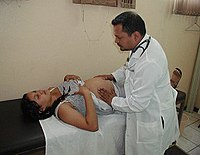
Photo from wikipedia
ABSTRACT Background: A high-risk pregnancy (HRP) is adversely affects the health of the mother, baby, or both. Most prenatal care research, rather than quality concepts, focuses on the adequacy of… Click to show full abstract
ABSTRACT Background: A high-risk pregnancy (HRP) is adversely affects the health of the mother, baby, or both. Most prenatal care research, rather than quality concepts, focuses on the adequacy of prenatal care and describes the emotional-psychological experiences of women with HRP. The main purpose of this study was to explore the perspectives of healthcare professionals regarding the quality of prenatal care for women with HRP. Methods: This qualitative study was conducted in three university hospitals and 12 comprehensive health centers in Ahvaz (Iran) from December 2020 to May 2021. In the present study, 10 midwives, 2 executive directors, and 7 specialists were purposefully selected with maximum diversity. In-depth semi-structured individual interviews were used to collect the data. Data were analyzed concurrently using Elo and Kinga’s content analysis. The MAXQDA software version 10 was used for data analysis. Results: During data analysis, the 6 main categories “infrastructure for care provision”, “optimal clinical care”, “organizing referrals”, “preconception care”, “risk assessment”, and “family-centered care” and 14 subcategories were identified. Conclusion: Our findings showed that professional groups focused on the technical aspects of caring. The findings from this study highlight several conditions that can affect the quality of prenatal care for women with HRP. Healthcare providers can use these factors to effectively manage HRPs, thereby improving pregnancy outcomes among women with HRPs.
Journal Title: International Journal of Community Based Nursing and Midwifery
Year Published: 2023
Link to full text (if available)
Share on Social Media: Sign Up to like & get
recommendations!